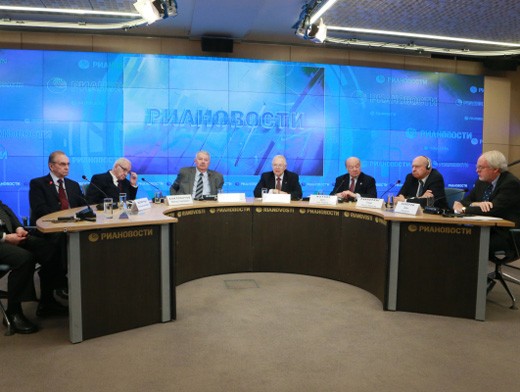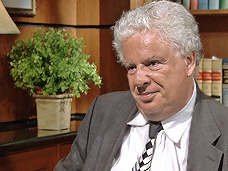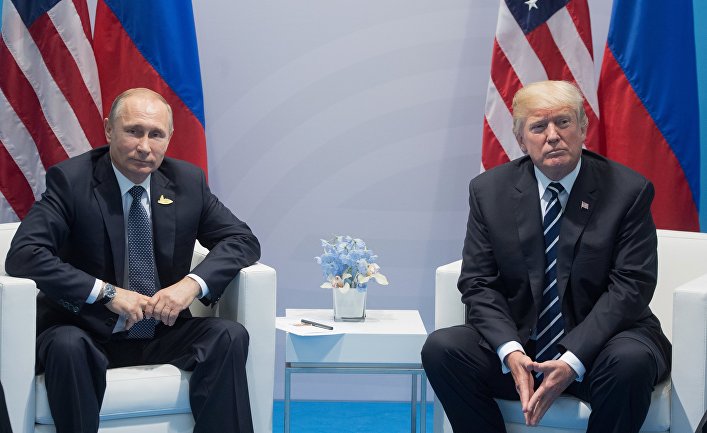
Published 19-04-2013, 07:23
 Moscow recently hosted a meeting of former
American ambassadors to Russia and Russian ambassadors to the US commemorating
the 80th anniversary of the restoration of relations in 1933. This gathering of
hugely experienced and wise individuals provided an opportunity to reflect on
the current state of US-Russia relations.
Moscow recently hosted a meeting of former
American ambassadors to Russia and Russian ambassadors to the US commemorating
the 80th anniversary of the restoration of relations in 1933. This gathering of
hugely experienced and wise individuals provided an opportunity to reflect on
the current state of US-Russia relations.
Though acknowledging that US-Russia relations have recently deteriorated, the ambassadors concluded their meeting on a positive note. John Beyrle, who served as US ambassador to Russia from 2008 to early 2012, urged the two countries to focus on what unites rather than divides them. He noted that despite numerous ups and downs over the decades, Russia and the United States have always managed to find a common language and ultimately base their relations on pragmatism. James Collins, US ambassador in Moscow from 1997 to 2001, was even more upbeat. He said he saw no fundamental reason why Russia and the US could not "find common purpose and means of cooperation to address the real issues that face both of our peoples."
The former ambassadors’ comments deserve to be taken seriously – these are, after all, the very individuals who helped shape US-Russia relations at critical junctures of the two countries’ recent history. However, the reality is that despite Russia’s abandoning of communism and important acts of solidarity such as contributing to NATO’s campaign in Afghanistan, ties between the two countries continue to founder.
There is no single reason for this development, but one of the main causes is arguably the fundamental difference in the two countries’ views on today’s international system. As yet, there has been no meaningful dialogue between the two countries about how to tackle that difference – on the contrary, the two sides continue to talk past each other.
Take, for example, the article published by Russia’s Foreign Minister, Sergey Lavrov, in the March 2013 issue of "International Affairs" laying out Russia’s foreign policy philosophy as reflected in the recently adopted "Foreign Policy Concept”. In it, Lavrov discusses what he sees as the stabilizing role of the Russian Federation – a role that he traces back to the policy advocated by Tsar Alexander III in 1893. Lavrov argues that his country does not want to have any enemies, nor is it seeking new alliances against any other country. Rather, it regards its role in international affairs primarily as a "balancing factor”.
Lavrov then goes on to characterize Russia’s current international stance as one of multi-vector "polyphony”. Thus, he argues, its recent calls for greater cooperation among the BRICS should not be depicted as anti-Western but as a push for the much-needed democratization (and hence stabilization) of the global system. He concludes that collective leadership by major civilizations is the surest way to prevent global conflict.
However, it is precisely views such as these that put Moscow in the crosshairs of Washington and its Western camp. The latter reject outright the idea of sharing responsibility with powers, such as Russia and China, which they regard as "autocracies” inherently hostile to their democracy. Similarly, Lavrov’s assertion that there is a "common spiritual and moral denominator” of values shaped over the centuries by all major civilizations clashes head-on with the notion that only Western democracy can embody the "universal values” to which all should aspire.
Ambassadors from the US and Russia no longer have to deal with the terrifying Cold War-era possibility of an outright nuclear confrontation between their two countries. Instead, one of the main tasks of diplomacy today is to try to bridge what appear to be inherently incompatible views on the international system. Paving the way towards a meaningful discussion might be a small step in the right direction.
Questions:
- •Are the differences between Russia and the United States inherently incompatible?
- •Which side is more in touch with contemporary global realities?
 The topic for the Discussion Panel is provided by Vlad Sobell,
The topic for the Discussion Panel is provided by Vlad Sobell, Editor, Expert Discussion Panel
Professor, New York University, Prague
Editor, Consensus East-West Europe
Expert Panel Contributions
Nicolai N. Petro
Professor, Department of Political Science
University of Rhode Island
Acupuncture vs. surgery
Russian and American goals are not fundamentally in conflict. Both countries aspire to a version of global stability that would allow them to preserve their pre-eminent global standing. Russia, as a regional power, focuses on stability in and around the CIS, whereas the United States, as a global power, seeks a global settlement. Unlike during the Cold War era, however, there is no ideological disagreement over whether a new international system is preferable to the status quo. Both countries are status quo powers because they benefit from the current international order.
But the philosophical assumptions that undergird the pursuit of similar objectives can still differ dramatically. An insightful article published in China’s influential People’s Daily in November 2011 argues that while America pursues the health of the international system through surgery, China prefers acupuncture and that this difference is rooted in cultural tradition.
Whereas America, and the West in general, believes that portions of the body afflicted by disease should be cut off to protect healthy organs from infection, the Chinese approach emphasizes the importance of restoring the entire body to health. Since surgical interventions disrupt the body’s "qi” and prevent complete recovery, low-trauma, long-term treatment is preferred. Lest his meaning be lost on the reader, the author highlights that even "surgically precise” military intervention can make matters only worse. Instead, he says, "one should use the smallest possible external interference to activate internal capabilities, causing the situation to gradually improve from the inside out”.
The increasingly apparent foreign policy alignment of Russia and China shows that both countries are more comfortable with the acupuncture approach to foreign policy. Indeed, America's insistence on treating various regions of the world "surgically” is one of the primary reasons for this new alignment. It is equally apparent that neither Russia nor China expects US foreign policy to change any time soon. Despite his noble electoral rhetoric, President Obama's foreign policy has essentially been a continuation of that of his predecessors. As a result, Chinese and Russian leaders have concluded that their disagreements with US strategy are culturally based, and probably permanent.
Which approach is more in touch with "global realities?” Impossible to say, since "global reality” is itself constantly being shaped by the actions of key participants. It is worth pointing out, however, that while the BRICS group is evidently an alignment of states designed to contain the excesses of American power, it also seeks to preserve and support American power in regions where the latter is deemed to play a constructive role, such as Afghanistan.
The door to cooperation in the construction of a new global partnership is therefore open. But whether the future will be one of conflict or cooperation will depend largely on whether future American elites will recognize the benefits of a partnership based on equality and mutual restraint or whether they will reject the idea that America is like other nations and cling to the view of former Secretary of State Madeleine Albright that "We are America; we are the indispensable nation. We stand tall and we see further than other countries into the future.” (NBC's Today Show, 19 February 1998.)
 Gilbert Doctorow
Gilbert DoctorowResearch Fellow of the American University in Moscow
Realism and idealism – worlds apart
The foreign policy of the Russian Federation is guided by realpolitik, or realism, meaning interest-based, indifferent to the regimes of other powers and sensitive only to shared or conflicting interests with their governments. The basic foreign policy of the United States today is guided by Wilsonian idealism, meaning values-based and insistent that peaceful and enduring relations can be forged only with other democracies. Both positions are in touch with global realities because both powers shape those realities by their actions, namely through their influence on their respective global partners. For the US, the partners are primarily its allies in NATO and other global military pacts. For Russia, the primary partners are to be found in the BRICS, the Shanghai Cooperation Organization (including its observer nations), the Eurasian Union and so forth.
These positions are compatible to the extent the two sides want them to be compatible. And only one side is in the driving seat, the United States, since it is America and no other country that is the arbiter of the world order. The US’s identification of other states as "democratic” is quite elastic, just as the identification of "free world” countries was elastic in the days of the Cold War. During the administration of George W. Bush, countries that might otherwise have been viewed by impartial onlookers as satrapies, dictatorships and so forth were routinely called "young democracies” by the United States if no other fig leaf was available to justify the quest for privileged relations. Thus, Ukraine and Georgia were promoted by the US for NATO membership notwithstanding the political situation in each of those countries. Meanwhile, Russia, which had a considerably greater claim to free and fair elections and respect for freedom of expression and other liberties, was relegated to the category of authoritarian state or "autocracy,” where it remains today in American cosmology.
Hence if one wants to determine the prospects for rapprochement or even a strategic alliance between Russia and the US, one has to look beyond the realist/idealist divide in the principles guiding their foreign policies. I see two reasons why the US so gleefully includes Russia on the "autocracy” list, which allows it to discredit the Russian regime as illegitimate and unworthy of close relations. The first is the unwillingness of Russia to kowtow to America’s global hegemonic aspirations. Russia under Vladimir Putin is virtually the only major country in the world that publicly disputes America’s diktat. This is not only because of the personal convictions of Russia’s leadership, but because Russia has minimal trade or any other form of dependency on the US and thus can do as it pleases. And what pleases it is displeasing to America: Russia does not turn the other cheek; rather, it applies a policy of "an eye for an eye” in response to diplomatic slaps and to the less visible but more tangible threats to its wealth and security in the form of American-led pipeline diplomacy and the military encirclement of Russian territory.
The second reason is Russia’s objective inability to fit into the small box in which America would like to contain it in order to prevent Russia from acting as a regional, not to mention world power. There was talk in the late 1990s, when chaos reigned in Russia and centrifugal forces were pulling the country apart, that the Federation might split into three parts. At least that was the hope openly expressed by Zbigniew Brzezinski and quietly nourished by other American politicians. That did not happen. A "resurgent” Russia, however, has no place in the global vision of American foreign policy. From the US point of view, it cannot be categorized as anything other than an "autocracy,” whatever the facts on the ground.
All of the foregoing does not mean that the two countries cannot do business or cannot work together on selected projects. They can and they will. But it is pointless to hope for any broader cooperation until and unless some emergency develops where the US absolutely needs Russian cooperation and support. Such moments do come, from time to time. The last such moment came after 9/11 and it was squandered by President Bush. Perhaps a future president will be more reasonable. The contingency factor in history should not be underestimated.
 Alexander Lieven
Alexander LievenPrivate Scholar of History and International Relations
Berlin
Russia’s strategic needs and options
Russia has a very long coastline and borders with 15 countries. Some of those countries are friendly, some of them are not. There are foreign military bases quite close to its borders. Ongoing conflicts have been minor to date. This could change rather quickly. The efforts to reform and modernize Russia’s armed forces have yet to prove successful. And the world is, as ever, full of the "unknown unknowns”.
To regard the US as the biggest strategic player (with about a hundred military bases around the world) is tempting, but it should be done with caution. There are signs in the US of increasing frustration with international relations and a tendency to seek solace in isolationist nostalgia. But what really matters are the plans to reduce the dependence on imported goods and raw materials, especially oil. The increasing intensity of the drone wars and the growing reliance on satellite technology could be seen as first steps toward the global projection of force by the joystick. An analyst with the German military suggested something along these lines to me. Economic autonomy and cheaper ways to protect America’s interests might make the US inclined to neglect the complexities of our planet and its inhabitants.
The disasters in Iraq and Afghanistan have changed the political landscape in that region, and it is unclear what will happen in the Middle East, North Africa and the Saudi peninsula. The simmering conflicts between China and its irritable neighbors are yet another matter. Korea could have repercussions no one wants to think about.
Iraq and Afghanistan sandwich Iran, which some consider the sole "winner” of America’s wars against Iraq. Iran and Russia will have to step into the void that will soon be left in Afghanistan. So, is Iran dependable? Or is it too preoccupied with Saudi Arabia and Israel and/or weakened too much by them? I don’t know. Moreover, the complexities of Russia’s relations with China – not to mention with India and Pakistan – escape me.
As a German and European who "thinks continental”, I can identify some strategic options. However, the European Union is facing the biggest crisis in its history and may well unravel if it fails to paper over its difficulties with money or does not face reality and do its homework. But where is the money going to come from or how is it going to get along with less?
Several years ago an official from the American intelligence community told me that if Europe invested heavily in its armed forces with the intent to use them, it could get unlimited credit in the world. This is, of course, a paradox because the Earth’s resources are not limitless. Bigger or more is not in itself better. And Europe is definitely in its post-heroic phase and enthusiasm for strategic interventions is at an all-time low. Even if some old men think that not enough young Germans are dying for our way of life.
So back to the US.
One common denominator between the US and Russia is their status as huge nuclear powers with no interest in the proliferation of these weapons. But is that really so? What do we really know about it?
Another is the threat of radical Islam. It became clear in the early 1990s that Islam would succeed the Soviet Union as America´s number one bogeyman. By then, the Soviet Union knew all about the Islamic threat. The US is fast disentangling itself from the Islamic world. But the latter remains at the doorsteps of Russia and Europe. Are the Islamic world and Russia natural strategic partners? Or is the next game of hot potato to start? Let us hope for the best.
Edward Lozansky
President American University in Moscow
Professor of World Politics, Moscow State University
Contrary to the widespread view that US-Russia relations have dramatically worsened, I see some positive signals in this area. Strange as it may sound, the way the so-called Magnitsky list was released and Russia's response to it suggest the desire of both sides to minimize the damage inflicted by US Congress and the lobbyists who pushed this bill through. The 18 practically unknown Russian names on the US list and the 18 similarly unknown American names on the Russian list that have been made public are a clear signal that both Washington and Moscow want this issue off the table as soon as possible. They have better and more important things to do – such as trying to manage the hugely dangerous North Korea crisis.
Another positive signal comes from a group of wise men – former American ambassadors to Russia and Russian ambassadors to the US who recently met in Moscow. The statement issued by the ambassadors urges both countries to concentrate on the real security and economic issues they are facing and the need to take into account the interests of both sides. The ambassadors reaffirmed the view that strategic and regional stability calls for coordinated rather than unilateral efforts.
The ambassadors did not hesitate to criticize their own governments, stating that "some legislation enacted in both countries does not help" – a clear reference to the Magnitsky and anti-Magnitsky Acts. Nowhere in the ambassadors’ five-page statement is there any empty rhetoric about the need for democracy promotion or difference in values. That is a very welcome sign.
Thomas Pickering, probably the only ambassador who is also engaged in business through the Boeing Company, was even blunter when he called the Magnitsky Act a mistake. He urged Washington and Moscow to build a positive cooperation agenda while avoiding public parades when we disagree.
Jack Matlock, the US Ambassador in the USSR from 1987 to 1991, also made this very important point: despite some differences on a number of issues, the most fundamental interests of both the United States and Russia are compatible.
The Obama Administration would do well to listen to another wise man – Thomas Graham, former head of the Russia Desk at the National Security Council who is now with the Kissinger Associates. Graham called the flow of Russia-bashing foreign-policy recommendations by Freedom House President David Kramer and Lilia Shevtsova, a senior fellow at the Carnegie Moscow Center, "a poor caricature of a true strategic approach which fails to grasp that approach's rigor and complexity and the strategist's hard-nosed, consistent commitment to American interests.”
Graham insists that a strategic approach to the formulation of America's policy toward Russia should start with a clear articulation of the US’s long-term national interests. This means, first of all, that America should acknowledge Russia’s importance for the realization of US interests – an importance that stems either from the contribution Russia can make or from the obstacles it can erect. The next step is to understand how Russia defines its own interests and priorities and why, and then consider what the United States could reasonably do to give Russia incentives to help advance America's goals or to reduce the obstacles to their advancement.
Of course, the next question is: Where are the people who can carry out this highly important and sensitive analysis and formulate US foreign policy recommendations? There is no doubt that such individuals do exist. America has plenty of smart strategists who are up to the job, but either they are otherwise engaged or their voices are ignored.
Unfortunately, some statements coming from the State Department sound very different from those expressed by the above-quoted experts who are capable of truly strategic thinking.
Former Secretary of State Hillary Clinton and current State Department spokeswoman Victoria Nuland repeatedly declared that the US government's funding of NGOs in Russia would continue despite the Kremlin's clearly stated intention to make those organizations comply with Russia's recently introduced replica of the Foreign Agents Act, which has been in effect in the States since 1938. The obvious question is: Can it be in US national interests to follow such a radical policy blatantly in defiance of Russian law?
Ambassador James Collins thinks that it cannot: "Whether we like some Russian laws or not, we must respect them," said Collins at a recent meeting at the Carnegie office in Moscow.
Well, Collins is one of the few wise men who can make himself heard. But we obviously need to hear more such voices.
Patrick Armstrong
Patrick Armstrong Analysis,
Ottawa, Canada
Countries enjoy claiming highfalutin values and principles as justification for their often sordid actions. But these principles are usually pretty malleable. Washington, for example, was firm on the principle of inviolability of borders in the Georgian case in 2008 but less so in Yugoslavia in 1999; Moscow firmly held the opposite position each time. Moscow was supportive of the human rights of Ossetians but not so much about those of Kosovars; Washington, again, the opposite. Each was adept at manufacturing reasons why the inviolable principles of one case did not apply in the other.
But it is pleasing to one’s to self esteem to claim high motives. For years Washington has claimed the moral high ground of "democracy” and now we see Moscow claiming to be the home of stability. These noble self-portraits look most convincing at some distance. For Moscow to claim to be the thumb that keeps the scales of world power balanced is to slip over its partial responsibility for the transformation of another Balkan squabble into a world war in 1914 and ignore most of the years between 1917 and 1990. Washington focuses its moral-quizzing glass on Russia rather than say, Saudi Arabia: an "Arab Spring” for Libya but not for Bahrain.
But above this normal level of sanctimony-cloaked interest, the US goes further with its bizarre obsession about Russia. It is bizarre because Russia is not very pertinent to Washington’s strategic and security concerns: it is not threatening nuclear war today; nor is Obama considering using force against it; nor does he see it as the greatest threat. Russia has surely seldom appeared in White House threat briefings for a decade and a half. If not a real opponent, then, Russia must fill some other need: a cost-free shadow opponent; a contrast that can be painted as dark as you like; an object of feel-good moral righteousness; a sullen teenager who must be brought to obedience.
Americans seem to need a rival, an opponent, a type of geopolitical chiaroscuro: the light can shine only against the darkness. Russia is large and significant and provides a contrast more substantial than, say, Venezuela.
Because US-Russia trade is pretty inconsequential, Russia is a low-cost object of periodic American fits of moral censure. An issue as trivial as Pussy Riot can be played up as a momentous violation whereas any sustained condemnation of the treatment of Shiites or Pakistani and Filipino servants in Saudi Arabia would come at a cost. Outrage against Russian "occupation” of parts of Georgia is cheap; outrage about Chinese occupation of Tibet is not. Russia’s sins are a perfect fit: giving a pleasing moral superiority without expensive consequences.
Or is Russia an ungrateful child? In the 1990s there was much talk about US aid and advice reforming Russia and some saw it as on the verge of becoming "just like us”. But it didn’t and such back-sliding cannot be forgiven.
And, of course, when you are looking down from a moral prominence, disagreement is sin. Moscow cannot just be disagreeing about the Syrian nightmare; it must be blocking "the legitimate aspirations of the Syrian people.”
So, the differences do seem incompatible so long as the curious American obsession endures.
As for global realities, how are the last two "humanitarian interventions” working out? The Guardian quotes reports identifying Hashim Thaçi, put into power by NATO, "as one of the ‘biggest fish’ in organised crime” in Kosovo and the less said about the "success” in Libya, the better. In these two cases, therefore, it doesn’t seem to be Moscow that is out of touch with global realities.
 Dale Herspring
Dale HerspringUniversity Distinguished Professor of Political Science
Kansas State University
All states have national interests, but those interests are far from being constant. They can always be "modified" depending on the ideological context and the specific situation at hand. At present, much depends on the leaders at the top. How interested are Obama and Putin in better relations? And how able is either of them to implement the policy he favors? From a distance, it seems that Putin could adopt and implement whatever policy he personally favored. That cannot be said about Obama. The American foreign policy process is more chaotic, beset by many conflicting interest groups.
Just as beauty is often in the eye of the beholder, one must determine what is meant by "contemporary global realities?" According to the likes of Thomas Hobbes, the world is governed by brutal rules; according to others, it is a kinder world, the sort that Jean-Jacques Rousseau advocated. Putin seems to subscribe more to the Hobbesian view, while Obama appears to think like Rousseau. I think Putin is closer to reality.
To move forward will require the willingness of both men to go beyond their respective Weltanschauung. It will require a compromise on the part of both (and their domestic supporters). The bottom line is how badly does either side want better relations and how willing are they to compromise? In my opinion, more meetings at the highest level (assuming they are willing to deal) are required as well as an understanding on Obama's part that Washington’s often chaotic policymaking makes it very difficult for a man like Putin to deal with the US.
 Martin Sieff
Martin SieffChief Global Analyst, the Globalist
US Needs to Abandon Missile Defense Fantasies
The differences between the United States and Russia are certainly not inherently incompatible: But they are real. And they need to be recognized on both sides before a drift into potentially catastrophic mutual alienation and confrontation takes place.
The warning model for both countries should be not the 1930s, the favorite rich vein to mine historical metaphors for American pundits otherwise utterly and ludicrously ignorant of all modern history. It should be the 16 years from the Hague Peace Conference of 1898 to the outbreak of World War I in 1914 – the catastrophe of European civilization.
The immediate and proximate causes for that war was the determination of the German General Staff to provoke it against Russia especially before its industrialization made it inevitably the dominant nation on the Eurasian landmass. However, Germany and Britain had been drifting into a state of emotional hostility at both the popular and policymaking levels for 16 years before the fatal clash for both of them began.
There was no significant ideological issue at stake between the two countries. The Germans acted like fools in building up their battle fleet, which they did not strategically need. It gave them the false fantasy they could challenge to defy Britain’s dominant role on the oceans it had held for more than 250 years.
Similarly, the George W. Bush administration’s enormous investment in ballistic missile defense (BMD) against intercontinental ballistic missiles (ICBMs) could certainly be useful in the event of a single or very limited long-range missile attack against the United States by North Korea, Iran or some other hypothetical rogue state. But it would be useless in any confrontation with Russia, or a future more heavily armed China.
The United States has only about 30 Ground Based Interceptors (GBIs) deployed (with a test interception success rate of 50 percent). Even under Defense Secretary Chuck Hagel’s accelerated plans, the US has only the resources to build 14 more in the next few years. This would be useless against any massed nuclear exchange with any significant power.
Far worse, like Kaiser Wilhelm II’s Imperial High Seas Fleet, the GBI program gives Americans the illusion (fed by an endless diet of witless, CGI-rich Hollywood blockbuster movies) that an all-secure "Astrodome” defense against nuclear ballistic missile attack actually exists. Of course, it does not.
Kaiser Wilhelm, and his macho, bull-headed, really stupid Grand Admiral Alfred von Tirpitz made the same mistake and it cost millions of German lives, including hundreds of thousands of children.
The Kaiser and Tirpitz really thought their fleet could both deter and break any British maritime blockade against Germany. It could do neither. Germany’s U-boats failed utterly in their efforts to blockade and starve Britain into submission in 1917.
What is not generally remembered in Britain and America today is that the British Grand Fleet succeeded strategically in blockading and staving Germany. At least 750,000 German civilians, most of them elderly people, women and above all young children, starved to death during the more than four years of the war as a result of that blockade. Instead of preventing catastrophe, the Kaiser’s idiotic faith in his fleet brought it down upon his people.
I do not oppose the investment of the US government in ballistic missile defense against potential rogue states. But it is crucially important for successive US governments to explain loudly and clearly to their own people both what it can and cannot do. And they have not done so.
It is also crucially important for successive US administrations, both Republican and Democrat, to recognize that America’s historic success and respect in the world came from being seen as a living example of the benefits of liberty, capitalism, democracy and freedom of speech to other nations – not from trying to impose or pressure other nations to adopt these principles on strictly American conditions.
The 1962 Cuban Missile Crisis sobered up the successive leaderships of both the United States and the Soviet Union. Over the following decades leaders in both Washington and Moscow recognized that maintaining a basic level of trust, verification and respect between them was far more important than their ideological competition in the Cold War. The Cold War has now been over for nearly a quarter of a century, but prominent ideologues and opinion-makers in Washington have forgotten that crucial lesson. US leaders need to respect Russia’s political and policy differences with them rather than indulge in futile and counter-productive lecturing. They need to follow the examples of their predecessors half a century ago and combine deterrent strength with cautious respect: Nothing is more important for the future of the human race.



_jpg/250px-ElbeDay1945_(NARA_ww2-121).jpg)








